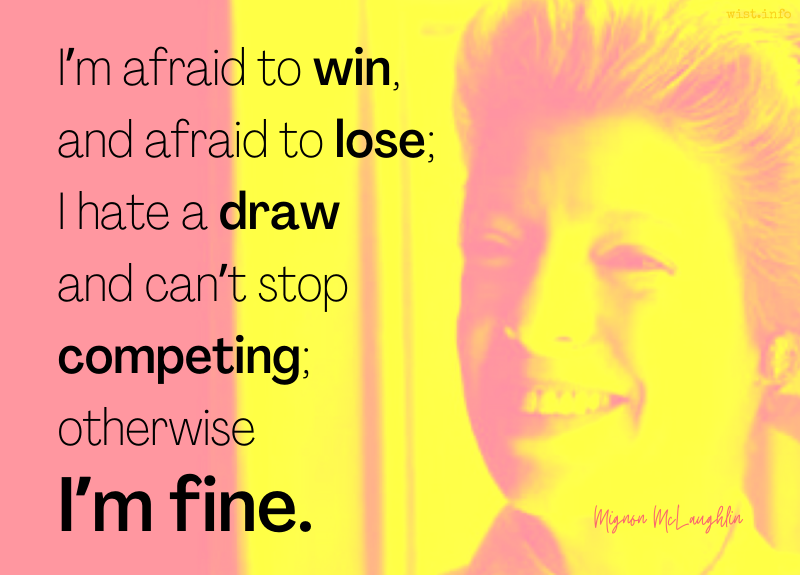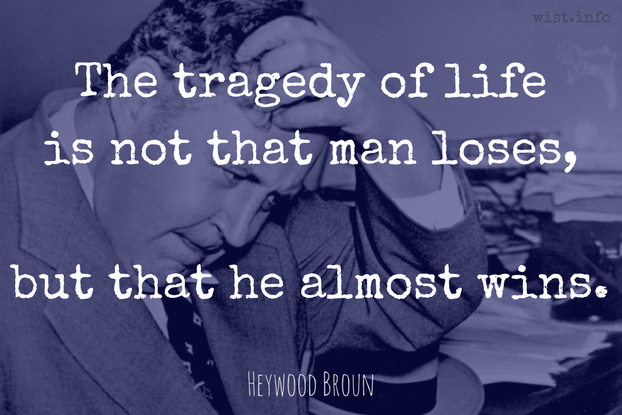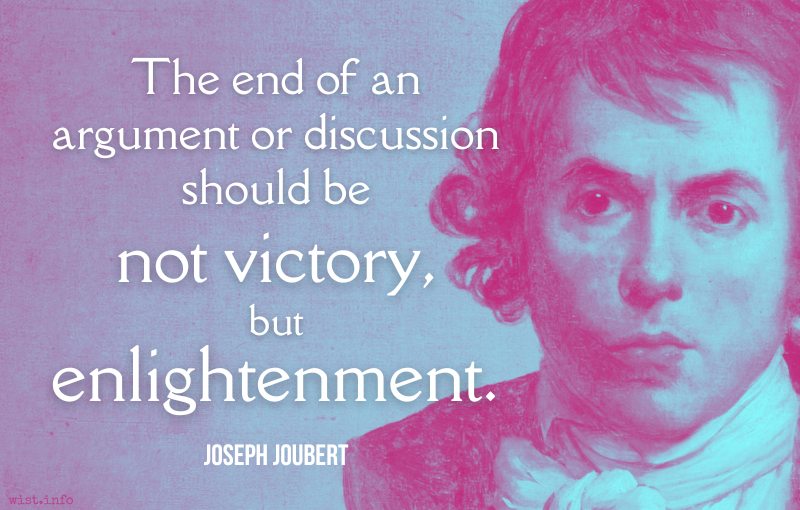If well thou hast begun, go on fore-right
It is the end that crowns us, not the fight.
Quotations about:
winning
Note not all quotations have been tagged, so Search may find additional quotes on this topic.
There are some who turn everything into warfare, who behave like social bandits and would like to conquer others in everything they do. They have no idea how to live peaceably.
[Hay algunos que todo lo reducen a guerrilla; bandoleros del trato, cuanto ejecutan querrían que fuese vencimiento, no saben proceder pacíficamente.]
Baltasar Gracián y Morales (1601-1658) Spanish Jesuit priest, writer, philosopher
The Art of Worldly Wisdom [Oráculo Manual y Arte de Prudencia], § 218 (1647) [tr. Maurer (1992)]
(Source)
(Source (Spanish)). Alternate translations:
There are some who turn every thing into a kind of skirmishing. They are Ruffians in Conversation; and would make a triumph of every thing they doe. They know not what it is to be peacefull.
[Flesher ed. (1685)]
There are persons who make a war out of everything, real banditti of intercourse. All that they undertake must end in victory; they do not know how to get on in peace.
[tr. Jacobs (1892)]
There are those who reduce everything to war, veritable highwaymen of friendly intercourse; they seek that all they push through be made a victory; and they know not peaceful pursuit.
[tr. Fischer (1937)]
Even when you are right, it is good to make concessions: people will recognize you were right but admire your courtesy. More is lost through holding on than can be won by defeating others. One defends not truth but rudeness.
[Aun en caso de evidencia, es ingenuidad el ceder, que no se ignora la razón que tuvo y se conoce la galantería que tiene. Más se pierde con el arrimamiento que se puede ganar con el vencimiento; no es defender la verdad, sino la grosería.]
Baltasar Gracián y Morales (1601-1658) Spanish Jesuit priest, writer, philosopher
The Art of Worldly Wisdom [Oráculo Manual y Arte de Prudencia], § 183 (1647) [tr. Maurer (1992)]
(Source)
(Source (Spanish)). Alternate translations:
It is civil to yield, even in those things wherein we have greatest reason and certainty: for then all know, who had reason on their side: and besides the reason, Gallantry is also discovered in the procedure. There is more esteem lost, by a wilfull resistence, then there is got by carrying it by open force. For that is not so much a defending of truth, as a demonstration of Clownishness.
[Flesher ed. (1685)]
Even in cases of obvious certainty it is fine to yield: our reasons for holding the view cannot escape notice, our courtesy in yielding must be the more recognised. Our obstinacy loses more than our victory yields: that is not to champion truth but rather rudeness.
[tr. Jacobs (1892)]
Even with the proof on your side, it is well to make concession, for your reasons are known and your gentlemanliness is recognized; more is lost in contention than can be gained in consummation, for such does not defend the truth, but only exhibits bad manners.
[tr. Fischer (1937)]
Conquer, but never triumph.
[Siege, aber triumphire nicht.]
Marie von Ebner-Eschenbach (1830-1916) Austrian writer
Aphorisms [Aphorismen], No. 9 (1880) [tr. Wister (1883)]
(Source)
(Source (German)). Alternate translation:
Be victorious but not triumphant.
[tr. Scrase/Mieder (1994)]
A garden is always a series of losses set against a few triumphs, like life itself.
May Sarton (1912-1995) Belgian-American poet, novelist, memoirist [pen name of Eleanore Marie Sarton]
At Seventy: A Journal, “Wednesday, June 23rd” (1973)
(Source)
I’m afraid to win, and afraid to lose; I hate a draw and can’t stop competing; otherwise I’m fine.
Mignon McLaughlin (1913-1983) American journalist and author
The Neurotic’s Notebook, ch. 4 (1963)
(Source)
Why do casinos lavish such gaudy gifts on someone who has just taken piles of their money? To ensure he doesn’t leave. The more gifts they give, the longer the gambler will stay. The longer he stays, the more likely he is to cough up his winnings. In fact, because of the false sense of his own skill he acquired while racking up his temporary purse, he’ll probably end up losing far more than he would have tolerated had he not found himself up in the first place. However cautious and determined people are when they begin, their good judgment goes out the window once they start to win.
In truth, prosperity tries the souls of even the wise; how then should men of depraved character like these make a moderate use of victory?
[Quippe secundae res sapientium animos fatigant, ne illi corruptis moribus victoriae temperarent.]
Sallust (c. 86-35 BC) Roman historian and politician [Gaius Sallustius Crispus]
Bellum Catilinae [The War of Cateline; The Conspiracy of Catiline], ch. 11, sent. 8 [tr. Rolfe (1931)]
(Source)
Alt. trans.:
- "A series of prosperity is often too much even for the wisest and best disposed: that men corrupted should make a temperate use of their victory could not be expected." [tr. Murphy (1807)]
- "For success unhinges the minds even of wise men; how then should they who were so depraved use their victory with moderation?" [tr. Rose (1831)]
- "For success tries the minds of wise men, much less could they, when their morals were corrupted, use their victory with moderation." [Source (1841)]
- "Success unsettles the principles even of the wise, and scarcely would those of debauched habits use victory with moderation." [tr. Watson (1867)]
- "Since even the wise have their temper tried by prosperity, much less could men of this abandoned character use their success with moderation." [tr. Pollard (1882)]
- "Successful situations overwhelm the minds even of the wise; still less wouild those men of corrupt morals moderate their victory." [tr. Woodman (2007)]
Back of every mistaken venture and defeat is the laughter of wisdom, if you listen. We go forward by failure. Every blunder behind us is giving a cheer for us and only those who are willing to fail shall taste the dangers and splendors of life. To be a good loser is to learn how to win. The real coward is he who sees no glory in failure.
It is fatal to enter any war without the will to win it.
Douglas MacArthur (1880-1964) American general
Speech, Republican National Convention, Chicago (7 Jul 1952)
(Source)
The tragedy of life is not that man loses, but that he almost wins.
Heywood Broun (1888-1939) American journalist, author
“Sport for Art’s Sake,” Vanity Fair (Sep 1921)
(Source)
Reprinted in Pieces of Hate, and Other Enthusiasms (1922).
We fought a military war; our opponents fought a political one. We sought physical attrition; our opponents aimed for our psychological exhaustion. In the process we lost sight of one of the cardinal maxims of guerrilla war: the guerrilla wins if he does not lose. The conventional army loses if it does not win.
Henry Kissinger (1923-2024) German-American diplomat
“The Viet Nam Negotiations,” Foreign Affairs (Jan 1969)
(Source)
Sometimes paraphrased as "A conventional army loses if it does not win. The guerrilla army wins if he does not lose."
To keep your marriage brimming,
With love in the loving cup,
Whenever you’re wrong, admit it;
Whenever you’re right, shut up.Ogden Nash (1902-1971) American poet
“A Word to Husbands,” Marriage Lines: Notes of a Student Husband (1964)
(Source)
Now that I have grown old, I realize that for most of us it is not enough to have achieved personal success. One’s best friend must also have failed.
W. Somerset Maugham (1874-1965) English novelist and playwright [William Somerset Maugham]
Comment (1959)
A comment recorded by a journalist on his 85th birthday, quoted in Richard Cordell, Somerset Maugham: A Biographical and Critical Study (1961). Cordell mentions the influence of La Rochefoucauld on the phrase, and it is therefore often attributed to La Rochefoucauld, though it is not in his Maxims.
Also attributed to Gore Vidal, Iris Murdoch, Genghis Khan.
Pithier (and more common) paraphrases:
More discussion of this quotation here: It Is Not Enough to Succeed; One’s Best Friend Must Fail – Quote Investigator®.
- "It is not enough to succeed; one’s best friend must fail."
- "It is not enough to succeed; one’s friends must fail."
- "It is not enough to succeed; others must fail."
- "It’s not enough that I should succeed, others should fail."
- "It is not sufficient that I succeed –- all others must fail."
The important thing in life is not the victory but the contest; the essential thing is not to have won but to have fought well.
[L’important dans la vie ce n’est point le triomphe, mais le combat, l’essentiel ce n’est pas d’avoir vaincu mais de s’être bien battu.]
Pierre Frédy, Baron de Coubertin (1863-1937) French pedagogue, historian, founder of the International Olympic Committee
Olympic Creed, Speech, Olympic Games, London (24 Jul 1908)
Alt. trans: "The important thing in life is not the triumph but the struggle, the essential thing is not to have conquered but to have fought well."
Original phrasing by de Coubertin: "The importance of these Olympiads is not so much to win as to take part."
De Coubertin was drawing from a sermon by Bp. Ethelbert Talbot at St Paul's Cathedral, London (19 Jul 1908): "We have just been contemplating the great Olympic Games. What does it mean? It means that young men of robust physical life have come from all parts of the world. It does mean, I think, as someone has said, that this era of internationalism as seen in the Stadium has an element of danger. Of course, it is very true, as he says, that each athlete strives not only for the sake of sport, but for the sake of his country. Thus a new rivalry is invented. If England be beaten on the river, or America outdistanced on the racing path, or that American has lost the strength which she once possessed. Well, what of it? The only safety after all lies in the lesson of the real Olympia -- that the Games themselves are better than the race and the prize. St. Paul tells us how insignificant is the prize, Our prize is not corruptible, but incorruptible, and though only one may wear the laurel wreath, all may share the equal joy of the contest. All encouragement, therefore, be given to the exhilarating -- I might also say soul-saving -- interest that comes in active and fair and clean athletic sports."
In my heart there may be doubt that I deserve the Nobel award over other men of letters whom I hold in respect and reverence — but there is no question of my pleasure and pride in having it for myself.
The end of an argument or discussion should be, not victory, but enlightenment.
[Le but de la dispute ou de la discussion ne doit pas être la victoire, mais l’amélioration.]
Joseph Joubert (1754-1824) French moralist, philosopher, essayist, poet
Pensées [Thoughts], ch. 8, ¶ 41 (1850 ed.) [tr. Collins (1928), ch. 7]
(Source)
(Source (French)). Alternate translations:
The aim of disputation and discussion should not be victory, but improvement.
[tr. Calvert (1866), ch. 8]
The aim of argument, or of discussion, should not be victory, but progress.
[tr. Lyttelton (1899), ch. 7, ¶ 31]
Those blush to lose a conquering game,
And fain would peril life for fame:
These bring success their zeal to fan;
They can because they think they can.[Hi proprium decus et partum indignantur honorem
ni teneant, vitamque volunt pro laude pacisci;
hos successus alit: possunt, quia posse videntur.]Virgil (70-19 BC) Roman poet [b. Publius Vergilius Maro; also Vergil]
The Aeneid [Ænē̆is], Book 5, l. 229ff (5.229-231) (29-19 BC) [tr. Conington (1866)]
(Source)
Of the crews of the two remaining ships racing at the funeral games of Anchises: Cloanthus' Scylla which is closing on the finish line; Mnestheus' Pristis which has come up from last place and may yet take the lead. (Cloanthus wins the race by offering a sacrifice to the sea gods.)
(Source (Latin)). Alternate translations:
These their new glory, honours got despise,
Unless they keep it, and to gaine the prize
Would sell their lives; success feeds them; they may
Because they think they can obtain the day.
[tr. Ogilby (1649)]
Resolv'd to hold their own, they mend their pace,
All obstinate to die, or gain the race.
Rais'd with success, the Dolphin swiftly ran;
For they can conquer, who believe they can.
[tr. Dryden (1697)]
These are fired with indignation, lest they should lose their possession of glory and honor they have won; and they are willing to barter life for renown. Those success cherishes; they are able because they seem to be able.
[tr. Davidson/Buckley (1854)]
These scorn to lose the honour that is their own, the glory in their grasp, and would sell life for renown; to these success lends life; power comes with belief in it.
[tr. Mackail (1885)]
These, thinking shame of letting fall their hardly-gotten gain
Of glory's meed, to buy the praise with very life are fain;
Those, fed on good-hap, all things may, because they deem they may
[tr. Morris (1900), l. 228ff]
These scorn to lose their vantage, stung with shame,
And life is wagered willingly for fame.
Success inspires the hindmost; as they dare,
They do; the thought of winning wins the game.
[tr. Taylor (1907), st. 31, l. 274ff]
The leaders now with eager souls would scorn
to lose their glory, and faint-hearted fail
to grasp a prize half-won, but fain would buy
honor with life itself; the followers too
are flushed with proud success, and feel them strong
because their strength is proven.
[tr. Williams (1910)]
These think it shame not to keep the honour that is theirs, the glory they have won, and would barter life for fame: those success heartens; strong are they, for strong they deem themselves.
[tr. Fairclough (1916)]
On the Scylla
They would give their lives to hold their place, they have won it,
The glory and honor are theirs already, almost;
And Mnestheus’ men take courage from their nearness;
They can because they think they can.
[tr. Humphries (1951)]
One crew was compelled by the shame of losing a prize they had all but
Gained for their own, and would give their lives for its glory; the other
Was fired by success -- they could do it because they believed they could do it.
[tr. Day-Lewis (1952)]
Cloanthus' crewmen
now think it a disgrace to fail to keep
the fame and honor they themselves have won,
and they would give their very lives for glory;
but Menestheus' men are strengthened by success,
they have the power because they feel they have it.
[tr. Mandelbaum (1971), l. 301ff]
One crew fought off the shame of losing honor
Theirs already, glory won; they'd give
Their lives for fame; but luck empowered the others
Who felt that they could do it, and so could.
[tr. Fitzgerald (1981), l. 294ff]
Cloanthus and his men on the Scylla saw the honour as theirs by right. They had already won the victory and had no intention of giving it up. They would rather have lost their lives than lose the glory. Mnestheus and his men on the Pristis were feeding on success. They could win because they thought they could.
[tr. West (1990)]
The former crew are unhappy lest they fail to keep
the honour that is theirs and the glory already
in their possession, and would sell their lives for fame.
the latter feed on success: they can because they think they can.
[tr. Kline (2002)]
One crew, stung by the shame of losing victory now
with glory won, would trade their lives for fame.
But Mnestheus and his crew, fired by their success,
can just about win the day because they think they can.
[tr. Fagles (2006), l. 256ff]
One crew would hate to lose the glory of an honor all but one. They'd trade their lives for victory. The others were encouraged by success. Belief in victory spurred them on.
[tr. Bartsch (2021)]
To know a man, observe how he wins his object, rather than how he loses it; for when we fail, our pride supports us; when we succeed, it betrays us.
Charles Caleb "C. C." Colton (1780-1832) English cleric, writer, aphorist
Lacon: Or, Many Things in Few Words, Vol. 1, § 265 (1820)
(Source)
My mother drew a distinction between achievement and success. She said that achievement is the knowledge that you have studied and worked hard and done the best that is in you. Success is being praised by others, and that’s nice too, but not as important or satisfying. Always aim for achievement and forget about the success.
If you don’t play to win, why bother to keep score?
Adolph Rupp (1901-1977) American college basketball coach
Comment (11 Jun 1958)
Rupp frequently returned to this phrase, usually in response to someone quoting to him from Grantland Rice's "Alumnus Football" (paraphrased, "It doesn't matter whether you win or lose, but how you play the game").
Variations:
Rupp wasn't necessarily the originator of this thought. Clair Bee, another US college basketball coach, said during the CCNY Point Shaving Scandal that ended his career, "If the kids aren't playing for keeps, why keep score?" (20 Feb 1951).
- "If it doesn't matter who wins or loses, then what in the hell is that scoreboard doing up there?"
- "If it doesn't matter, then why does every school have a scoreboard? If it doesn't matter who wins why do 25,000 football fans follow a team 400 miles and sit in eight inches of snow to watch the game?" [Source]
- "If winning isn't so important, why do they keep score?" [Source]
Sometimes attributed to Vince Lombardi.
More discussion of this quotation: The Big Apple: “If winning isn’t important, why keep score?”





























